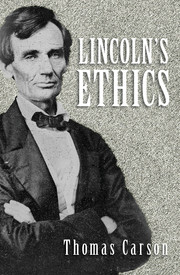How This Book Came to Be
Published online by Cambridge University Press: 05 May 2015
Summary
Because some might wonder how a philosopher came to write a book about Lincoln, I offer the following account.
Since grade school, I have had a very strong interest in history. During junior high and high school, I read many history books, often to the exclusion of working on my homework. In college, I fell in love with philosophy and, for a time, stopped reading much history. Then, in 1974, during the middle of my time in graduate school, I purchased a battered edition of Carl Sandburg's six-volume biography of Lincoln in a used bookstore in Providence, Rhode Island. I loved this book. Reading it was a pleasure I cherished every evening for a long time. I was then in the thrall of a rather facile dismissal of Lincoln as a racist who did not care nearly enough about slavery, this despite the cogent arguments of my friend David Braun to the contrary. After reading Sandburg's biography I found Lincoln to be a much more impressive and compelling person than I had imagined. Jeff Tulis suggested that I next read Lord Charnwood's beautiful and appreciative biography of Lincoln. After that, I continued to read a number of other books about Lincoln.
In the late 1970s, David Braun and I went to the Lincoln Memorial. I read the words of Lincoln's Second Inaugural Address carefully for the first time and was deeply moved. It is by far the most beautiful and compelling political speech I have ever read. I noticed that other people reading it were also moved (some were in tears). My wife Judy was also moved by the words of this speech when we went to the memorial several years later.
Once I started teaching, I continued to read history regularly most evenings for recreation and escape. This became my most serious hobby.
- Type
- Chapter
- Information
- Lincoln's Ethics , pp. xxv - xxviiiPublisher: Cambridge University PressPrint publication year: 2015



